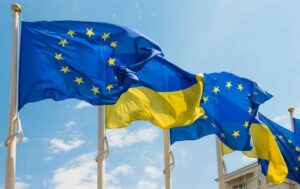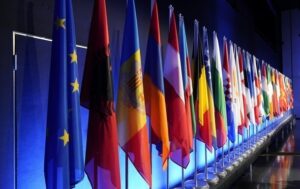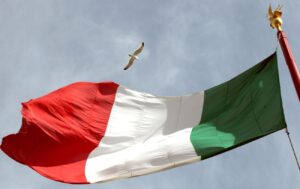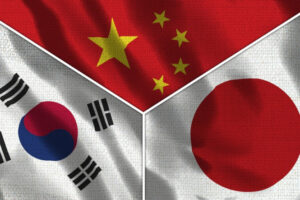
President of the European Council Antonio Costa and President of the European Commission Ursula von der Leyen will visit Uzbekistan on April 3-4 to participate in the first EU-Central Asia Summit.
The summit will be chaired by Uzbek President Shavkat Mirziyoyev and will be attended by the leaders of Kazakhstan, Kyrgyzstan, Tajikistan and Turkmenistan.
During the summit, the EU is expected to reaffirm its commitment to expanding cooperation in areas of mutual interest, including transport and digital interconnectivity – within the region and with the EU, strategic raw materials, economy and security, and the transition to clean and efficient energy sources.
“The first EU-Central Asia Summit will strengthen our commitment to work together for peace, security and sustainable development, in full respect of international law,” said António Costa.

An agreement between Ukraine and the EU on security guarantees will be signed on Thursday in Brussels at a meeting of the European Council.
“We will have a special guest, whose name we are not allowed to mention, but you all wrote about it, so we don’t have to confirm it. And you also know that tomorrow, after the family photo (of the EU leaders – IF-U), a security commitment (between Ukraine and the EU – IF-U) will be signed,” a senior European diplomat told reporters in Brussels on Thursday.
He did not name the “special guest,” but earlier European media had reported on the visit of Ukrainian President Volodymyr Zelenskyy to Brussels.
The EU summit will be held in Brussels on June 27-28.
Answering journalists’ questions about how similar the content of this document is to the many security agreements already signed with the EU countries, the diplomat noted that “not all member states have signed agreements with Ukraine.” “The EU is a kind of umbrella in which everyone will assume obligations, and everyone will contribute by approving these security commitments,” the source explained.
At the same time, he emphasized the importance of the current meeting of the European Council, which will be the first after the elections to the European Parliament. “This is a new cycle that opens now with a clear idea of what the strategic agenda will be, how the leaders of the European Council intend to shape other institutions and work for the next five years – this is one part of the decision that will be made, and the second part is the names and team that will be responsible for implementing and working on this program,” the diplomat explained.
The EU leaders are expected to approve candidates for senior positions in the EU: President of the European Commission (the leaders are expected to approve the current President Ursula von der Leyen for a second term), President of the European Council (previously discussed the candidacy of former Portuguese Prime Minister Antonio Costa), High Representative of the EU for Foreign Affairs and Security Policy (previously nominated for this position was Estonian Prime Minister Kaja Kallas) and President of the European Parliament (discussed the re-election. ..).
In addition, the agenda will include issues of competitiveness, security and defense, migration, and the Middle East.

The Peace Summit, which will open on Saturday, June 15, in Switzerland, will be attended by 100 delegations, of which 92 represent states from around the world and 8 – international organizations, according to the press service of the Swiss government.
“President Viola Amerd will open the Summit on Peace in Ukraine on Saturday, June 15. The summit will be attended by 100 delegations, including 57 heads of state and government from around the world. The purpose of the summit is to launch a peace process, build trust and identify ideas on the next steps towards such a process. All states present should be given the opportunity to put forward their vision of a just and lasting peace in Ukraine,” the statement said.

Italian Foreign Minister Antonio Tajani said that his country is ready to host and organize the 2025 Ukraine Recovery Conference, the Italian Foreign Ministry website reports.
“The Italian government is firmly committed to supporting the recovery and reconstruction of Ukraine, as evidenced by the wide and authoritative presence of our business community in Berlin. We have also put this issue at the center of our G7 presidency: we expect concrete results from the Conference and are ready to take over the organization of its holding in Italy in 2025,” Tayati said at the annual Ukraine Recovery Conference, which this time took place in Berlin.
The politician also added that Italy’s bilateral assistance amounts to more than two billion euros. This is the amount excluding military aid and the contribution to the pan-European aid.
“The 2025 Recovery Conference will be attended by heads of state and government from 77 countries: a total of about 1,800 participants are expected. 500 companies will be invited, including 150 from Germany, 150 from Ukraine and 200 from other participating countries,” the Foreign Ministry added.

In the first trilateral meeting since 2019, the neighbors sought common ground on trade and cultural exchange while tiptoeing around thorny security issues.
The leaders of South Korea and Japan on Monday sought to restore economic cooperation with China, their largest trading partner, after years of deteriorating relations, but their trilateral talks were overshadowed by rising tensions between China and the United States, Seoul and Tokyo’s most important military ally.
The trilateral meeting, which was attended by South Korean President Yun Seok-yeol, Japanese Prime Minister Fumio Kishida, and Chinese Premier Li Keqiang, the second highest-ranking official, was the first in four and a half years.
The talks focused mainly on areas where it is easier to find common ground, such as protecting supply chains, facilitating trade, and cooperating to address aging populations and emerging infectious diseases. The leaders tiptoed around sensitive regional security issues such as Taiwan and North Korea.
“The three countries agreed to expand practical cooperation so that their peoples can experience its benefits,” Mr. Yun said during a joint press conference with Messrs. Kishida and Lee, declaring 2025 and 2026 “years of cultural exchanges” between the three countries.
But in the hours before the meeting, North Korea helped to emphasize the major differences between the three neighbors. Pyongyang announced that it would launch a long-range rocket within nine days to put a military spy satellite into space. United Nations Security Council resolutions prohibit the country from launching such missiles because they use the same technology needed to build intercontinental ballistic missiles.
North Korea’s increasingly aggressive military posture is a concern for South Korea and Japan. The North has also expanded its arms trade with Russia in defiance of UN sanctions, supplying artillery shells and missiles for Moscow’s military operations in Ukraine, according to US and South Korean officials. In response, Moscow has been accused of providing energy and technological assistance that could contribute to North Korea’s missile program.
South Korea and Japan have called on China, North Korea’s biggest benefactor, to use its economic clout to help curb Pyongyang’s nuclear and missile programs. Until now, Beijing has been reluctant to use this leverage, viewing North Korea as a buffer against the U.S. military on the Korean Peninsula.
On Monday, both Mr. Yun and Mr. Kishida sharply criticized the North Korean plan to launch the satellite. But Mr. Li, who serves under Xi Jinping, China’s top leader, did not condemn North Korea, but merely called on all sides to “exercise restraint” and work toward a “political settlement.”
As the press conference in Seoul was winding down, 20 South Korean warplanes conducted air drills south of the inter-Korean border as a warning of “immediate and strong” retaliation for North Korea’s provocation.
China, Japan and South Korea have agreed to hold a trilateral meeting every year since 2008 to discuss regional cooperation. But the plan has often been disrupted by diplomatic disputes, and most recently by the pandemic. Monday’s meeting in Seoul was the ninth such meeting and the first since December 2019.
During the years-long hiatus, strategic competition between Washington and Beijing has intensified, which has also deteriorated relations between China and the two US allies. China has flexed its military muscle and expanded its territorial ambitions in the South China and East China Seas, while the United States, Japan, and South Korea have increased the number of joint military exercises and strengthened missile defense and other security cooperation.
China’s ties with the two U.S. allies have become so strained in recent years that analysts say the revival of the trilateral summit is an achievement in itself. But common interests compelled Beijing and its two neighbors to revive it.
Mr. Yun said on Monday that the three countries had agreed to hold regular summit meetings.
East Asia’s neighboring countries, which together account for more than a fifth of global economic output, need regional stability and cooperation, especially in supply chains, to recover from the post-pandemic economic downturn. While Japan and South Korea consider the United States their most important ally, hosting 80,000 U.S. troops, their leaders face pressure at home from businesses competing for better access to China.
China is betting that it can appease Japan and South Korea by offering them greater access to its market and reducing Washington’s influence. To this end, China has agreed to resume negotiations on a free trade agreement between the three neighbors, emphasizing increased economic cooperation as a means of maintaining regional peace and stability.
He portrayed the United States as meddling in Asian affairs, pressuring Japan and South Korea to form a bloc to curb China’s development. Washington has built a wall of restrictions to deny Beijing access to the latest semiconductors and is calling on allies such as Japan and South Korea to cooperate.
On Monday, Mr. Li indirectly criticized Washington, calling for a “multipolar” world order and opposing any attempts to create “blocs” and “politicize” trade issues.
In recent years, Japan and South Korea have grown closer, improving relations that have long been strained by historical disputes. They have also expanded trilateral military cooperation with the United States to deter North Korea and China.
Japan and South Korea have called on China to address concerns about the difficulties of doing business in China. Mr. Kishida called for the speedy release of Japanese citizens detained in China on suspicion of espionage.
During bilateral talks on Sunday, South Korea and China agreed to establish new channels to discuss security and supply chain cooperation, said Kim Tae-hyo, deputy director of national security in Mr. Yoon’s office.
Mr. Yoon’s policy of bringing South Korea closer to the United States has coincided with a sharp drop in South Korean exports to China. According to government data, this year the United States overtook China as South Korea’s largest export market for the first time in two decades.
Source: https://www.nytimes.com/2024/05/27/world/asia/china-japan-korea-trilateral.html

President of Ukraine Volodymyr Zelenskyy has said that Ukraine and its partners do not consider the possibility of Russian representatives attending the inaugural Peace Summit to be held in Switzerland.
“Today we talked a lot about our Formula for Peace. I am grateful for the support of Mr. President. I informed Mr. President about the preparation of the global Peace Summit at the level of leaders, which is being organized in Switzerland – the inaugural Peace Summit,” he said during a press conference with the Turkish President in Istanbul.
According to Zelenskyy, “it is obvious that Turkey’s special role deserves to be demonstrated at the Peace Summit and in the joint work of the world majority to fully implement the Peace Formula.”
“As for the format of the inaugural Summit itself, we do not see any representatives of Russia at this Summit. We do not see how people who block, destroy and kill everything can be invited. We want to get a result. The result of a just peace, and a just peace for Ukraine,” the President of Ukraine said.
Therefore, Zelenskyy noted, “first, the civilized countries of the world will develop a detailed plan and have a result (based on the results of the first Peace Summit – IF-U).”
“And only then will they involve representatives of Russia – those who will be ready for a just peace,” he concluded.
Earlier, during a press conference with Zelenskyy, Turkish President Recep Tayyip Erdogan said that Turkey was ready to host a peace summit, but with the participation of Russia.